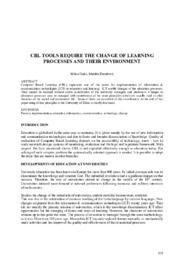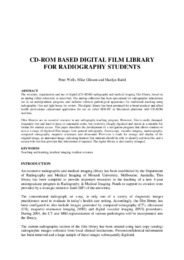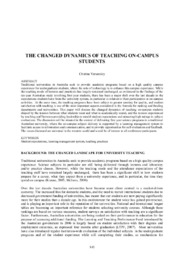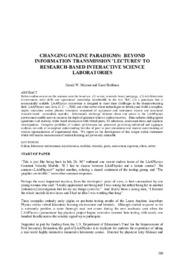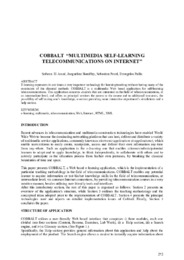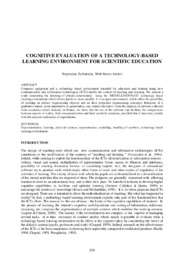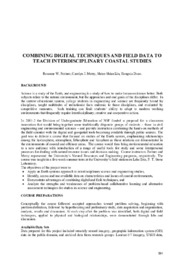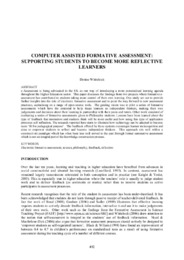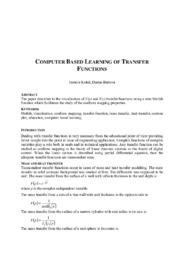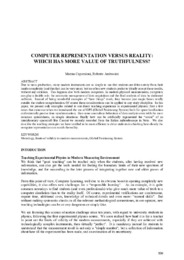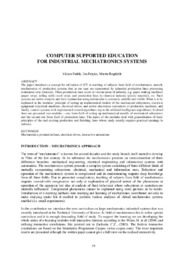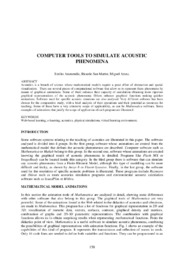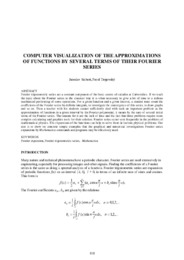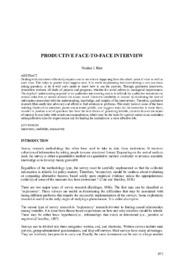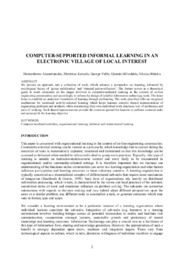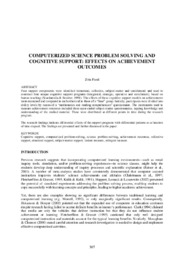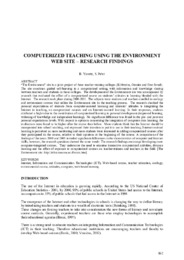Browsing Computer Based Learning in Science (CBLIS) by Title
Now showing items 21-40 of 337
-
Card game: attempts by primary level Education pupils to learn binary encoding
(University of Cyprus, 2007)This paper focuses on the learning of binary encoding by primary school pupils within a learning experiment mainly based on their being involved in playing a game. In fact, nineteen 6th Grade pupils participated in ... -
CBL tools require the change of learning processes and their environment
(Department of Educational Sciences, University of Cyprus, 2003)Computer Based Learning (CBL) represents one of the terms for implementation of information & communication technologies (ICT) in education and learning. ICT enable changes of the education processes. They cannot be realized ... -
CD-ROM based digital film library for radiography students
(Pedagogical Faculty of University of Ostrava, 2001)The structure, organisation and use of digital (CD-ROM) radiography and medical imaging film library, based on an analog (film) collection, is described. The analog collection has been specialised for radiographic ... -
The changed dynamics of teaching on-campus Students
(University of Cyprus, 2007)Traditional universities in Australia seek to provide academic programs based on a high quality campus experience for undergraduate students, where the role of technology is to enhance this campus experience. While the ... -
Changing online paradigms: beyond Information transmission 'lectures' to research-based interactive science laboratories
(Department of Educational Sciences, University of Cyprus, 2003)Robust online courses in the sciences must be based on: (1) sound, research–based pedagogy, (2) rich laboratory environments with skills and operational knowledge transferable to the wet ‘lab’, (3) a paradigm that is ... -
Cobbalt “multimedia self-learning telecommunications on internet”
(Department of Educational Sciences, University of Cyprus, 2003)E-learning represents in our times a very important technology for learning/teaching without having many of the constraints of the classical methods. COBBALT is a multimedia Web based application for self-learning ... -
Cognitive evaluation of a technology-based learning environment for scientific education
(Department of Educational Sciences, University of Cyprus, 2003)Computer equipment and a technology based environment intended for education and training using new communication and information technologies (ICTs) mofify the context of teaching and learning. We present a study concerning ... -
Combining digital techniques and field data to teach interdisciplinary coastal studies
(Department of Educational Sciences, University of Cyprus, 2003) -
Computer assisted formative assessment: supporting students to become more reflective Learners
(University of Cyprus, 2007)e-Assessment is being advocated in the UK as our way of introducing a more personalised learning agenda throughout the Higher Education sector. This paper discusses the findings from two projects where formative eassessment has ... -
Computer based learning of transfer functions
(Pedagogical Faculty of University of Ostrava, 2001)The paper describes to the visualisation of F(p) and F(z) transfer functions using a new Matlab function which facilitates the study of the conform mapping properties. -
Computer representation versus reality: which has more value of truthfulness?
(Department of Educational Sciences, University of Cyprus, 2003)Due to mass production, many modern instruments are so simple to use that students are driven away from their inside complexity (and this fact can be very nice); but too often now students prefer to blindly accept those ... -
Computer support of innovation´s Creativity
(Pedagogical Faculty of University of Ostrava, 2001)Using of algorithmic methods of the intensification of constructive process logically results in an idea for the creation of computer programs capable of raising efficiency of invention and design activity. In a basis of ... -
Computer Supported Education For Industrial Mechatronics Systems
(University of Zilina, 2005)The paper introduces a concept for utilisation of ICT in teaching of subjects from field of mechatronics, namely mechatronics of production systems that in our case are represented by industrial production lines processing ... -
Computer tools to simulate acoustic phenomena
(University of Zilina, 2005)Acoustics is a branch of science whose mathematical models require a great effort of abstraction and spatial visualization. There are several pieces of computational software that allow us to represent these phenomena by ... -
Computer visualization of the approximations of functions by several terms of their Fourier series
(Department of Educational Sciences, University of Cyprus, 2003)Fourier trigonometric series are a constant component of the basic course of calculus at Universities. If we teach the topic about the Fourier series in the classical way it is often necessary to give a lot of time to a ... -
Computer-adaptive testing in science education
(Department of Educational Sciences, University of Cyprus, 2003)Dealing with interviews effectively requires one to see what is happening from the other's point of view as well as one's own. This helps to predict what happens next. It is worth emphasizing that interviewing is not just ... -
Computer-based antenna education at the Technological educational institute of crete
(University of Cyprus, 2007)In the past most electronic engineering students tended to have repulsion against subjects related to microwaves, electromagnetics and antennas, especially due to their abstract, theoretically demanding, and complex mathematics ... -
Computer-supported informal learning in an Electronic village of local interest
(University of Cyprus, 2007)We present an approach and a collection of tools, which advance a perspective on learning, informed by sociological theory of ‘group stabilization’ and ‘situated action-reflection’. The former serves as a theoretical guide ... -
Computerized science problem solving and cognitive support: effects on achievement outcomes
(University of Zilina, 2005)Four support components were identified (structural, reflective, subject-matter and enrichment) and used to construct four unique cognitive support programs (integrated, strategic, operative and enrichment), based on human ... -
Computerized teaching using the environment Web site – research findings
(Department of Educational Sciences, University of Cyprus, 2003)“The Environment” site is a joint project of three teacher-training colleges (Kibbuzim, Oranim and Orot Israel). The site combines guided self-learning in a computerized setting, with information and knowledge sharing ...

